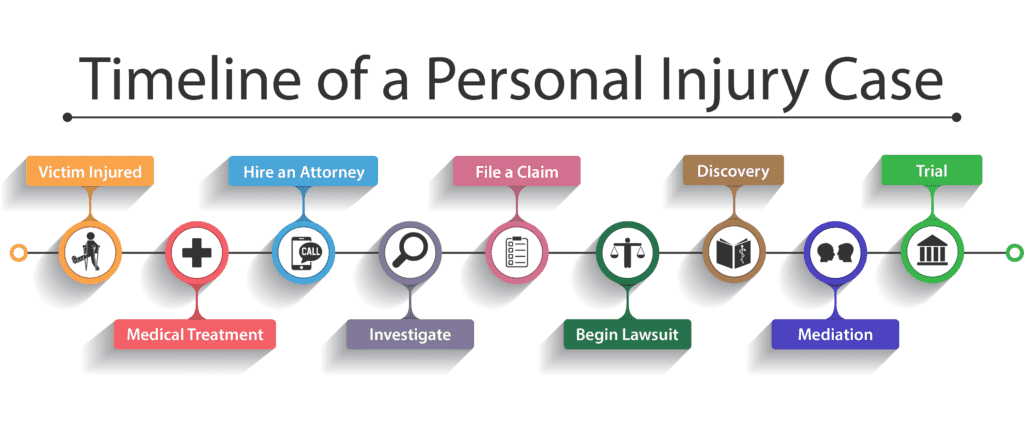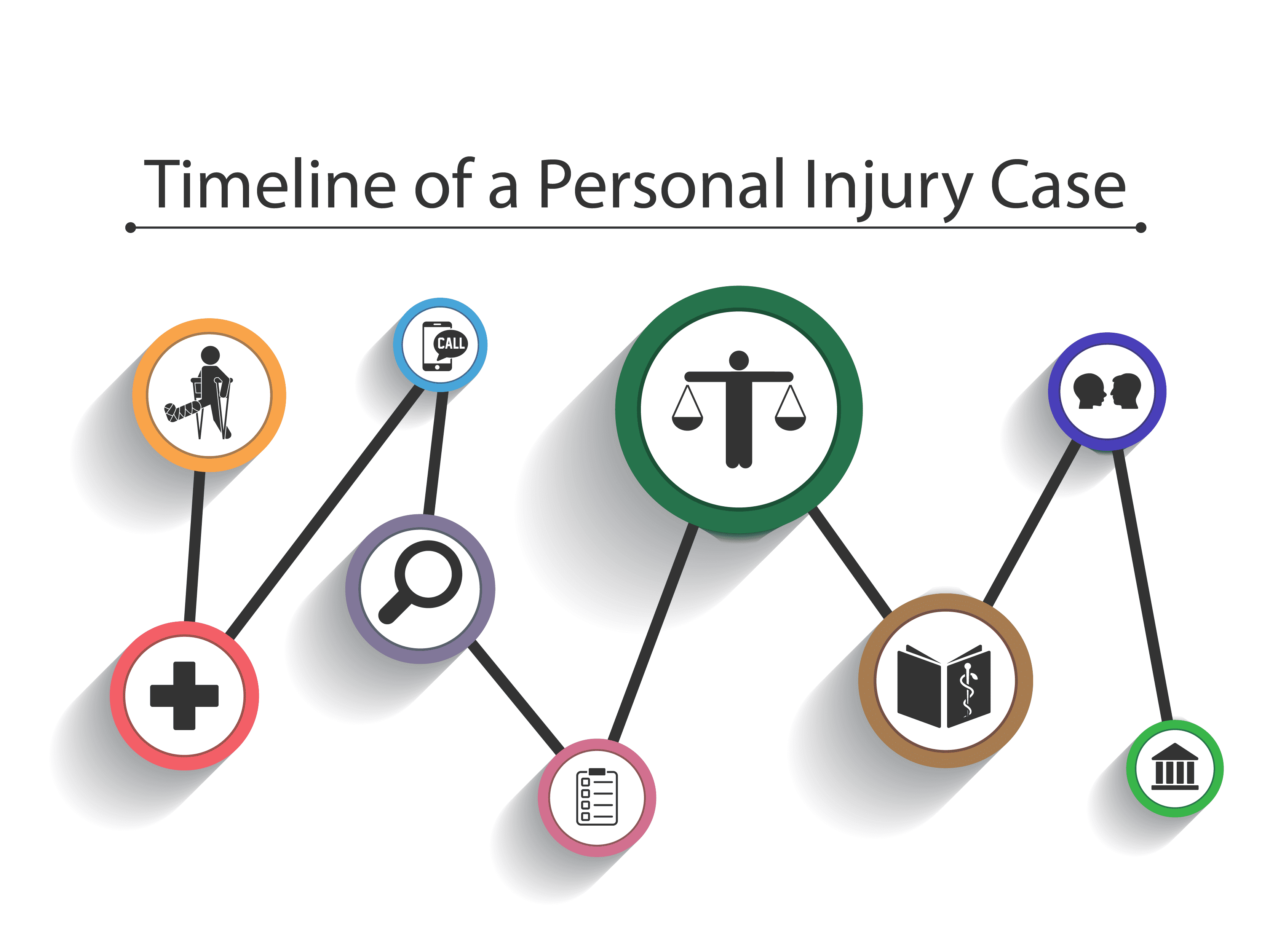Understandably, the process can seem daunting. No person in the industry of helping injury victims pretends that it’s not. However, the more educated you are in the process, the less stressful and daunting the process can be. Here, we seek to explain the steps of a personal injury case—from accident to trial—in the format of a timeline. Although not all of these steps will apply to all cases, it will be helpful to understand the timeline of a personal injury case.

Personal Injury Settlement Timeline
- Accident or Injury Occurs
- Seek Medical Attention
- Consult an Attorney
- Investigates Claim and Medical Records
- File an Insurance Claim or Demand a Settlement
- Lawsuit is Filed
- Discovery
- Mediation and/or Arbitration
- Trial
1. Accident or Injury Occurs
Nobody ever expects an accident or injury to occur. It’s just not something that people keep in mind during their daily routine. Even if they are conscious of the dangers around them, when the moment strikes, it is still unexpected.
At least, it can be frustrating and stressful. At worst, it can be permanently debilitating or deadly. However, inconveniencing or frustrating an accident or injury can be, it is important to stop, collect your thoughts, and think about the future for you and your family.
This mostly takes the form of documenting evidence and following the proper procedures so that you can collect financial compensation for your losses in the future. It is your right; it is necessary. All of the things you should do after an accident are really quite simple.
Collecting Evidence
If you are injured in a slip-and-fall, or any other type of accident or incident, make sure you collect evidence. You should:
- Call the police
- Take lots of pictures
- Get copies of everything (IDs, insurance cards, license plates, etc.)
- Gather witness contact information
- Take notes of any relevant information, like traffic cameras, weather conditions, construction zones, store conditions, conditions on the property, who you spoke to, etc.
Anything and everything that could help you to prove your case later is relevant. And of course, seek medical attention.
If you suffer a slip-and-fall injury at a business establishment, make sure to notify store personnel and collect any individual witnesses’ names and contact information. Ask for a copy of the incident report. If the establishment will not provide you with a copy and claim it is confidential, make notes about the information you provide in the report.
Do not make a formal statement. If the cause of your fall is a substance or dangerous condition, make sure to take photographs as this can be crucial evidence in establishing the defendant’s negligence.

2. Seek Medical Attention after Accident
After you are involved in an automobile accident or injury, seek medical attention as soon as possible. Injuries do not always appear right away, especially after a traumatic incident. This is especially true if someone is involved in a particularly severe auto accident.
Immediately afterward, it is natural to experience a rush of adrenaline and shock. This is your body’s natural way of eliminating pain so that you can get out of a dangerous situation. This bodily response is why people with serious injuries can do amazing feats in the heat of battle or some other traumatic event.
Be sure to take photographs of any visible injuries—bruises, cuts, scrapes, and abrasions—you may have sustained. These types of injuries will heal with time and therefore documenting them to be used later in pursuing your personal injury claim is essential. Even if you do not think you are injured, you should still be seen by a medical professional right away.
This is for two reasons. First, you may have an injury that you cannot see or feel at first. For example, an EMT may notice that you have signs of a concussion or whiplash.
Second, in the event you start to feel pain later—which is quite likely—you will have proof that you saw a doctor right away. Insurance companies can often use a situation in which someone denies treatment at first against them as a supposed sign “they weren’t really injured.”
Personal Injury Protection (PIP) Benefits
Indeed, if you do not seek medical treatment within the first 14 days after an auto accident, you may lose your entitlement to your $10,000.00 Personal Injury Protection (PIP) benefits available under your own auto insurance policy. When you do see a medical provider, it is critical that you are very explicit and thorough with providing to the physician each of the injuries and symptoms you are experiencing. Even if you do not feel a particular symptom or fact is relatively significant, thorough medical documentation of your injuries is the cornerstone of evidencing your claim to the insurance company.
Even if you don’t go to the hospital in the ambulance that arrives, you should still head straight there after all the other necessities are handled. You should also continue to seek necessary medical care if you are still experiencing ongoing symptoms. Just like a denial of emergency care after an injury can be used by the insurance company against you, gaps in medical care will also significantly damage your claim.

3. Consult a Personal Injury Attorney
Some may think that this step seems to come a little early in the timeline. That, perhaps you should wait to see what the insurance will offer or wait for a diagnosis before you seek the advice of a legal professional? This is not the case, and for a simple reason: attorneys will not take cases that do not need an attorney.
So, you have nothing to worry about just seeking their advice. At best, an attorney who specializes in the area of law you need help with can get you a settlement that is much greater than what an insurance company would give you on your own. At worst, you use the free consultation to get some much-needed advice.
According to a study done by the Insurance Research Council (IRC), those who hire an attorney in a personal injury case receive 3.5 times larger settlements than those who settle with the insurance adjuster on their own. When you meet with an attorney, they can assess if you have a workable case and determine the best course of action for you, with them or without them. Once it is decided if the attorney will take the case, fees will be negotiated.
Most Florida Personal Injury Attorneys work off a contingency fee contract. That is, the attorney receives compensation from the settlement proceeds, if any, based on a percentage. According to Florida law and the Florida Bar, a standard contingency fee contract will state that the attorney’s fee in pre-litigation is 33 1/3% up to a million dollars and that after an answer to a complaint is filed the fee is increased to 40% of any recovery up to 1 million dollars.
Speak with your prospective attorney regarding the fee so that you understand how the attorney’s fee is calculated and what the breakdown of the attorney’s fees and costs are at the end of your case. You should also discuss with your attorney the time frame of your specific case. Ask how long the firm will take to build your case before sending out an initial demand to the insurance company. Try to determine whether the law firm will file a lawsuit on your behalf if the offer from the insurance company is insufficient to compensate you for your losses or whether the law office operates as a “settlement mill” and will not take the time, effort, and money to litigate your case.

4. Investigates Claim and Medical Records
Once you hire an attorney, they will begin to investigate the claim and review your case. The first thing that your attorney will do is thoroughly interview you. They will want to know how the accident happened, information about your background, and any medical conditions you had before and after the incident.
They will also need to know any and all places you received medical treatment for your injury. All the information gathered will be quite thorough. This process is often done by someone called an intake specialist.
Don’t Hide Anything from Your Attorney
Some of the information may be personal and some may seem irrelevant, but there is a reason for every question. Most importantly, an attorney needs to be ready for anything and do their best to avoid any surprises later. If you were injured in the past, tell your attorney.
If you have large debts, tell your attorney. Clients and attorneys should be as honest with each other as possible. You must disclose your past medical history to your personal injury attorney in order for he/she to adequately prepare your case.
The most frequent defense insurance companies take in auto accident cases is that your injuries are pre-existing or degenerative in nature. In order to combat this defense, your attorney must have a thorough and complete understanding of your past medical history. Even if you’ve suffered from similar symptoms before, your attorney will be able to establish a baseline of your before and after crash physical state by analyzing your complete medical records.
Invariably, insurance companies have a way of discovering your medical history whether or not you disclose it to them. Enabling your attorney to gather this information from the outset of your claim will help to best prepare your case. Next, the lawyer will begin to collect all of your medical records and bills relating to the injury. This will include any doctors you saw, what they said, their treatment recommendations, medicines, etc. This too will be thorough. Sometimes this can take a long time, depending on your treatment.
The process will take time. Good attorneys will help you through the process and ensure you are getting the medical treatment you need despite your ability to pay. During this process, make sure to adequately communicate with your attorney regarding the doctors you do see. If the original doctor who is treating you refers you out to a specialist, make sure to advise your attorney that a referral has been made so that your attorney can request those medical records in a timely manner and keep your file updated.

5. File an Insurance Claim or Demand a Settlement
Many personal injury cases are settled before they ever reach a court. This is a good thing in some circumstances, and not so in others. Some firms take on mass amounts of clients with the intent of settling early for a low amount. If they do this enough times, they can make a lot of money.
However, a good attorney will analyze the unique situation, using the threat of court to their advantage. This is the difference between hiring a small, experienced firm and a big-budget settlement mill.
How The Claims Process Works in Different Cases
In auto accidents, first, a claim will be filed with the at-fault driver’s insurance company before an actual lawsuit is filed. A minimal amount of car insurance coverage is required in most states. In Florida law, this is known as Personal Injury Protection (PIP).
If the injury was not caused by an auto accident, your attorney will look into who was at fault and begin a claim with their insurance. In slip-and-falls, this may be the store‘s liability insurance carrier. In cases of medical malpractice, it may be with the hospital‘s liability insurance carrier.
After filing a claim with the at-fault party’s insurance company, they will assign a claims adjuster to investigate the case and negotiate a settlement. If an insurance company is not involved, a demand letter can be sent to the other party mandating a settlement for the injuries sustained. A demand letter lays out your theory of liability (i.e., who is at fault and why), what your injuries are as reflected in your medical records, and what amount you are demanding in compensation.
If an offer is made in response to your demand, your attorney will advise you on the situation and discuss the pros and cons of accepting the offer. Oftentimes, a counteroffer will be made and your attorney should attempt to negotiate a higher settlement amount than the amount of the initial offer.
The Cost/Benefit Analysis in Your Case
Your attorney should also explain to you the cost/benefit analysis of accepting a settlement at this stage in the case (before a lawsuit has been filed) rather than filing a lawsuit. As discussed above, the attorney’s fee in a personal injury action under a contingency contract increases to 40% after an Answer to a Complaint is filed. If the offer by the insurance company only increases slightly throughout litigation, you may end up with a similar net settlement had you resolved your case prior to filing a lawsuit.
Each case is different depending on the facts and circumstances of liability, the insurance policy limits of the at-fault party, and your injuries and amount of medical bills. You should speak with your attorney about all the pros and cons of resolving a case or moving forward prior to accepting a settlement.

6. Filing a Personal Injury Lawsuit
If a settlement with the insurance company cannot be reached—mostly likely because they will not pay what the case is worth—it is time to file a lawsuit. Under Florida Statute, a personal injury lawsuit must be filed within four (4) years of the injury or accident; however, the sooner the better.
Lawsuits are not always the best course of action, but sometimes it is the only thing that insurance companies respond to. They may feel greater pressure to reach a more fair settlement once the lawsuit has been filed against them. A lawsuit on your behalf is initiated by filing a Complaint in the Circuit Court in the County where the incident occurred.
At the same time, your attorney will request a Summons be issued by the Clerk of Court. The Summons, Complaint, and any corresponding discovery will be served upon the tortfeasor Defendant by a process server. When the Defendant is served, the Florida Rules of Civil Procedure govern the time frame each party must abide by during the litigation process and states that the Defendant must file an Answer to the allegations in the Complaint within 20 days.
The initiation of a lawsuit commences the “litigation” phase of your personal injury claim. Now, instead of negotiating your claim directly with an adjuster from the insurance company, there will be Defense counsel appointed to represent the Defendant who will be your attorney’s primary point of contact throughout the process. One of the most common questions a personal injury attorney receives after the filing of a lawsuit is, “how long will litigation take?” In Florida, the court system tells us that ideally, from commencing a lawsuit to ultimate resolution, the process should take a year and a half.

7. Both Sides Begin Discovery
Discovery is the process in which each party investigates what the other party’s legal claims and defenses are. The Florida Rules of Civil Procedure allow each party to propound certain types of written discovery upon the other. In an auto accident case, the Florida Supreme Court requires parties to serve standard interrogatories which essentially request background biographical information (e.g., name, date of birth, current and former addresses, employment history) as well as information about the incident itself (e.g., describe the incident, were you wearing a seatbelt? Did a mechanical failure contribute to the incident occur?)
The interrogatories will also inquire into the injuries you are claiming, which medical providers you have seen as a result, and the damages you’ve incurred. Standard auto accident interrogatories will also ask about medical providers you have treated with in the past ten (10) years, whether you were suffering from any physical disability or sickness at the time of the crash and whether you were wearing eyeglasses or hearing aids. Interrogatories are limited to thirty (30) absent good cause shown and Court approval. Your attorney will assist in guiding you in responding to interrogatories.
Requests for Production and Admissions
Parties are also allowed to serve onto the opposing party a discovery request known as “Request for Production” which allows the party to ask for actual tangible documents relating to the claim and defenses. In addition, parties can engage in discovery through what are known as “Request for Admissions,” essentially requesting the other party admit to certain facts (e.g., that the incident did in fact occur on a certain date and at a certain location, that the Defendant driver owned the vehicle he/she was operating). A plaintiff will have thirty (30) days from the date the discovery requests are propounded upon him/her to respond.
Depositions
The next step in discovery involves each side taking depositions. Typically, a Defendant will request a deposition of the Plaintiff be scheduled after receiving the Plaintiff’s responses to the discovery requests outlined above. This allows the Defendant to subpoena both your past and current medical records prior to deposing you.
A deposition is simply your testimony given under oath in front of a court reporter or stenographer who is making a transcript of the questions and answers. A defense attorney, or multiple defense attorneys depending on the case, will be the ones asking you questions at your deposition. Questions will generally reflect those asked in your interrogatories with specific and elaborated questions based on your responses.
Your attorney will help you best prepare for the types of questions to expect. Depositions of experts retained by either side (e.g., an accident reconstructionist, biomechanical engineer, life care planner, radiologist) can and will be deposed when preparing a case for trial.
Expert Witnesses
When you file a lawsuit for personal injuries in Florida, Florida Rule of Civil Procedure §1.360 allows the Defendant to hire a physician of their choice to perform a Compulsory Medical Exam (CME), also known as an Independent Medical Exam (IME). The CME doctor will assess your injuries and provide an opinion to the Defendant regarding the cause of your injuries, whether or not they are related to the car crash or incident, what injuries, if any, you sustained, what medical treatment was necessary and reasonable, and whether you suffered a permanent injury. Remember, a doctor performing a Compulsory Medical Examination is not your treating physician. He/she does not establish a doctor-patient relationship with you.
A CME doctor is not responsible for your medical care; indeed, he/she provides no medical treatment to you. A CME doctor’s sole purpose is to evaluate you on behalf of the Defendant and more likely than not, render an opinion favorable to the entity that hired him/her (the Defense). Your attorney will explain to you what to expect should you have to undergo a Compulsory Medical Examination.

8. Injury Case Mediation and/or Arbitration
Once all or most of the information from discovery has been collected, both sides’ lawyers will generally start trying to reach a settlement again. This process is known as an alternative dispute resolution. It is kind of a “now you know what you are up against” situation. Sometimes the lawyers can settle a case just by talking among themselves, sometimes they can’t.
Mediation
Arbitration
This second type of alternative dispute resolution is called arbitration. In arbitration, a hearing will take place between the plaintiff and defendant, judged by a neutral third party. The difference between the two is simple: mediation is not binding, arbitration is.
When the arbitrator makes a decision about the settlement, it is final. This process is often thought of as a mini-court case.
Sometimes, a court may require that a case goes to arbitration instead of to actual court. This may happen if the judge thinks a reasonable settlement is within reach. Other times, it may be voluntary to save both sides the expense of court costs.

9. Personal Injury Trial
Finally, if a settlement cannot be reached using all the above options, the case will go to trial. Personal injury trials can vary in length from hours to months. At the trial, all the information that has been gathered through discovery (physical evidence, interrogatories, depositions, photos, witnesses, etc.) will all be presented to a jury for them to decide on the settlement amount.
No one can predict with any degree of certainty the likely outcome of a trial as it is six different individuals from all different walks of life that make up the jury and are the ones who ultimately decide the verdict. Your attorney may conduct a focus group, or mock trial, essentially presenting the case to a group of similarly situated individuals to that of the jury in order to better ascertain what a jury may think some of the important points or weaknesses in the case may be to better address those areas at trial. Your attorney should sit down with you prior to trial and thoroughly explain to you the process, risks, and benefits of trying your personal injury case.
For clarification on the terms you have encountered here, visit our Legal Glossary.
Contact Our Attorneys for Help Today
If you have been injured as the result of someone’s negligence, you should seek financial compensation for the damages they have caused. It is not fair for one family to bear the financial burden caused by another person. In fact, it is your right to recover.
At the law office of Dolman Law Group Accident Injury Lawyers, PA, you will experience the “Dolman Law Difference” — our commitment to personal service and accessibility. All of the injury claims we represent are handled by one of our lawyers. Each and every client will get the personal cell phone number and email of the attorney handling their case.
We have been working for your years to build a reputation of trust and hard work. We do not settle with insurance companies easily. Call us today at (727) 451-6900. We look forward to hearing from you.
800 North Belcher Road
Clearwater, FL 33765
727-451-6900
*The above information was written and reviewed by either Attorney Matthew Dolman or another injury lawyer at the Dolman Law Group Accident Injury Lawyers, PA which has a combined 90 plus years of experience practicing Florida personal injury law. Matthew Dolman himself has been practicing personal injury law in Clearwater and St. Petersburg for the last fifteen (15) years. The information provided comes from extensive research and years of experience trying legal cases in courtrooms throughout Florida.







